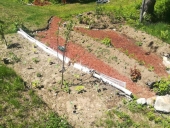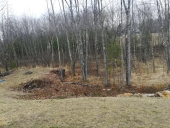



Casie Becker wrote:May I suggest you try beneficial nematodes instead of neem oil. They cover the insects you have mentioned as well as fire ants and fleas. When I use them I have to hope for a period of cooler and wetter weather than is common in my area but it really helps me with the fire ants. Everything else incidental but nice as a side benefit. I doubt you can get away with not mowing at all. Even here where we are currently in drought I have to go pull several saplings that have sprouted in my yard. If you invest in a good tool for uprooting particularly stubborn species of tree and shrub you may be able to reduce it to only a few times a year. Especially if you mow a few paths for the most important access points.
As a child I grew up playing in fields of scrub cedar, prickly pear and wild grasses that were taller than I was. We would trample our own paths and uproot whole rooms to play in. We thought we were building secret playhouses in the grass but as an adult I now know our parents were tall enough to easily see us as we played. Good memories, much better than any I have of a lawn. Just make sure your kids know what not to dig up.



